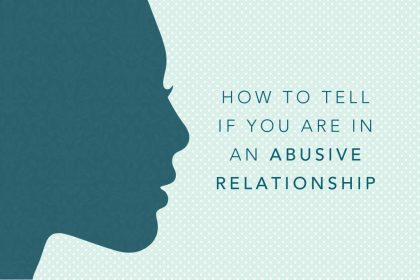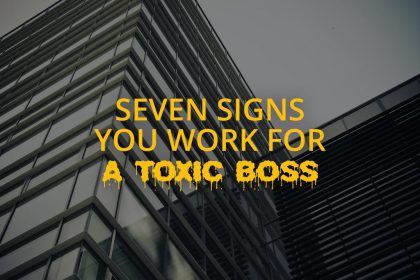Six signs someone may be a narcissist
How can you identify a narcissist and protect yourself from them? We look at six signs someone may be a narcissist and what to do.
Narcissists can cause a huge amount of damage and emotional pain, so it’s important to be able to identify one, and protect yourself as soon as possible.
There’s one big problem though: narcissists are VERY good at hiding their true selves. Sometimes their narcissism can be obvious straight away, or common behaviour traits may give them away. But often a narcissist will be able to act ‘normal’ for a while.
And they are often very good at working out what kind of person you want them to be, and displaying those characteristics. It’s only later on, when they struggle to contain the real them (or feel safe enough to reveal their true nature) or you become a victim of their behaviour that you realise you inadvertently let a narcissist in.
I have been educating myself on narcissists for 17 years, ever since I left an abusive marriage and wanted to understand what had happened to me. I have even written a number of articles on narcissism. And yet, in the years since I have still been taken in by people personally and professionally who latterly showed narcissistic traits.
So don’t feel bad if you are reading this article after being hurt by a toxic person. Or if, during reading it, you come to the realisation you are in some form of relationship with a narcissist.
What is a narcissist?
Before we look at common narcissistic traits to look out for, it is helpful to explore exactly what narcissism is, and what makes someone a ‘narcissist’.
Narcissistic personality disorder (NPD) is a cluster B personality disorder. It’s still considered a controversial diagnosis, as there is a lack of consensus on the key features of the disorder and its boundaries. But broadly, people with NPD display a pattern of grandiosity, a constant need for admiration, and a lack of empathy.
The DSM-5 criteria for narcissistic personality disorder requires that someone demonstrates five or more of the following traits:
- They have a grandiose sense of self-importance, for example, they might exaggerate their achievements or talents, or expect to be considered superior without merit.
- They are preoccupied with fantasies of unlimited success, power, brilliance, beauty, or ideal love.
- They believe they are special and unique and can only be understood by or should associate with, other special or high-status people or institutions.
- They require excessive admiration.
- They have a sense of entitlement, such as an unreasonable expectation of especially favourable treatment or automatic compliance with their expectations.
- They are interpersonally exploitative and take advantage of others to achieve their own ends.
- They lack empathy and are unwilling to recognise or identify with the feelings and needs of others.
- They are often envious of others or believe that others are envious of them.
- They display arrogant and haughty behaviours and attitudes.
The differences between overt and covert narcissists
There are also two subtypes of narcissist it is important to be aware of: overt narcissists and covert narcissists. Here are the key differences between them:
- Overt narcissists tend to be more grandiose, thick-skinned and attention-seeking. They will come across as entitled and arrogant with no obvious anxiety. They can be socially charming and will exploit others.
- Covert narcissists tend to be more vulnerable, fragile and thin-skinned. They will appear inhibited, overly-sensitive and chronically envious of others. They are usually shy and outwardly self-effacing, while secretly harbouring feelings of grandiosity.
Many people with narcissistic personality disorder can move between the two types, depending on what is happening in their life. And one common trait that both types share is that they are extremely self-absorbed.
What causes narcissism?
No one knows exactly why someone becomes a narcissist. It is thought that narcissistic personality disorder could be linked to a variety of factors including:
- Environment: As a child they receive either too much adoration or too much criticism that doesn’t match their actual experiences and achievements.
- Genetics: They may inherit narcissistic personality traits.
- Neurobiology: It could be caused by a connection between the brain and behaviour and thinking.
Put these risks factors together, and if you have a child who has a genetic tendency to develop the disorder, and they are exposed to overprotective or neglectful parenting, it could lead to the development of NPD.
Six signs someone may be a narcissist
Narcissist personality disorder needs to be formally diagnosed. However, you don’t need an official diagnosis to spot a damaged and dangerous person.
So, to help you identify a potential narcissist before they get the chance to hurt or damage you, or to minimise the damage if you are already in a relationship with them, here are six narcissistic traits and behaviours to look out for.
1) An exaggerated sense of self-importance
The first, and most common trait of narcissism to watch out for is an exaggerated sense of self-importance. A narcissist may feel they should be in a higher position or role at work, for example, or assume that their work deserves more credit than it deserves.
They will constantly need admiration, compliments and special treatment. You may notice in conversation that they describe encounters with others in which the other person comments on their exceptional looks, achievements or personality.
They’ll also seek to ensure they are the centre of attention, or get preferred treatment. For example, if they are a speaker at an event, they will want to be on the main stage. And if they aren’t, will take pains to ensure you know they should have been there, but there was a reason why it didn’t happen.
There are some easily-spotted signs of this exaggerated sense of self-importance, such as the size of someone’s signature. It’s generally accepted that the size of a CEO’s signature is an indicator of narcissism. Not surprisingly, given this insight, companies led by CEOs with large signatures perform worse than companies led by CEOs with small signatures.
So if you know someone who always seems to have tall tales about receiving special treatment and recognition, or who always needs to be centre stage or get the best of everything, it could be a sign they have narcissistic tendencies.
2) A lack of empathy
Empathy is an essential element in healthy relationships, but narcissists are unable to truly empathise with other people.
A narcissist cannot understand the emotions, needs, and points of view of others. As a result, will not take into account the feelings of others as they make decisions or act, and instead prioritise their own needs or wishes.
The problem with spotting this particular trait, is that narcissists have learned to cover up their lack of empathy when they initially meet people by using love bombing. When someone ‘love bombs’ you, you will feel like you are the centre of their world. They will lavish gifts and compliments upon you, and will go out of their way to make you feel special and appreciated.
However, this is a cynical facade. The narcissist doesn’t really care about you or your feelings. They have simply got to know enough about you in order to manipulate you. And they use that knowledge to ensure you feel seen, respected and even loved.
Once they feel they have you safely under their spell, they’ll drop the facade and leave you feeling confused and hurt. You’ll think it’s something you have done and will often try to ingratiate yourself with the narcissist in order to win back their respect and/or affection.
So how can you spot a narcissist, and avoid being the victim of love bombing? There are a few giveaway signs to look out for. Look for how a narcissist speaks about or treats others. If they are critical of others or treat them poorly, it’s an indicator or what might soon be coming your way.
Narcissists often have a trail of exes who have treated them poorly, or were in other ways not satisfactory. So if your new partner is critical of their exes, it could be a red flag. Often people who have escaped an abusive relationship discover that the ‘evil’ exes they’d been trained to hate were actually just earlier victims of the narcissist.
Likewise, if you work in an environment where people suddenly leave their jobs, or are criticised (to their faces or behind their backs) by a manager, it could be a clue you’re working in a toxic workplace.
I’ve personally seen incredibly hardworking and talented professionals destroyed by one jealous colleague. The number of people who have left this company is a huge warning sign that, only now, other colleagues are beginning to notice.
3) A constant need for attention and validation
Despite their often grandiose exterior, narcissists are actually incredibly thin-skinned, and need a constant supply of both attention and validation to prop-up their fragile self-esteem.
So they will make sure they are the centre of attention wherever possible. For example, if they are at someone else’s birthday dinner, they may turn up late or have some drama that ensures all eyes and ears are on them instead. They’ll also engineer conversations so they are the main topic, or find ways to ensure you feel compelled to compliment them somehow.
Narcissists are often surrounded by drama – real or deliberately generated – for this very reason. A common strategy they will use is virtuous victim signalling. This is describing a scenario where they are the victim of someone (often a ‘jealous hater’) who uses underhand tactics they personally would never sink to.
So if you know someone who is always surrounded by drama, or always being picked on my someone else, while themselves claiming to be whiter-than-white, it’s potentially a clue this person could be a narcissist.
4) Gaslighting
Narcissists are extremely adept at manipulating others and finding ways to control the way you think, feel and act. And their favourite tool to achieve this is gaslighting.
Gaslighting is a subversive way of making you doubt your own feelings, instincts, and even your sanity. The term comes from a 1938 stage play called Gas Light in which a husband attempts to drive his wife crazy by dimming the lights in their home – and denying it when she mentions it.
When gaslighting you a narcissist may deny something happened. For example, they might insist they or even you did not do or say what you recall. They may even tell you you are crazy or irrational for thinking that.
So if someone you know is often challenging your recollection about something, or undermines your beliefs or memories, they could be gaslighting you. They may also diminish your feelings – telling you that you are being too sensitive about something that has upset you – and even blame you for their mistakes.
Here are some common phrases you may notice a narcissist using that can indicate gaslighting:
- You always make a big deal of things
- You always say that
- You’re being sensitive
- You don’t really feel that way
- You’re always over-dramatic
- You’re the one with the problem
- If you don’t do this you are selfish
- You’re just imagining it
- You made me do it
- It didn’t happen
- I never said that
- You’re just being paranoid
Gaslighting can be particularly damaging as it is is usually done gradually over time, so you don’t notice that your self-belief, confidence and autonomy are gradually being eroded.
5) Boundary violations
Respecting someone’s boundaries is an important part of any healthy relationship. However, narcissists don’t recognise or respect anyone else’s boundaries; their entire motivation is to ensure their needs 0 and theirs alone – are met.
This means that anyone in their life is merely a tool to help them get what they want. And your boundaries, if they even notice them, are an inconvenience to be disregarded. Worse still, narcissists often use your boundaries to demonstrate their power and assert control over you.
For example, a narcissist may intrude on your personal space, ignore your privacy, or make you do things that make you uncomfortable. They might call you when it is convenient for them and expect you to pick up, or insist on entering the bathroom when you have asked for privacy.
It’s not uncommon for abusers (who often display many narcissist traits) to insist their partner does things that make them feel uncomfortable. This can be spending money on something you don’t think is a wise buy or investment, telling someone something you would rather not, imposing yourself on others when you know it’s not appropriate, or even insisting you engage in sexual acts you do not wish to participate in.
The reason why narcissists push you to violate your boundaries is that it destabilises, demoralises and diminishes you, while demonstrating to themselves the power they have over you. You may notice that, over time, you have been gradually pushed to a point that you do and accept things that you would never have put up with previously.
So if you find that someone – a friend, relative, lover, boss or colleague – is often asking you to do things that make you feel uncomfortable it could be a sign they are narcissistic, especially if they don’t listen to or respect your reasons for not doing it.
And to be clear, we are not talking about healthy encouragement to leave your comfort zone and grow as a person. But someone who makes you feel bad if you do not do what they expect of you, especially if it violates your values, with no personal gain for yourself.
6) Lack of accountability
No one likes to realise or acknowledge they have made a mistake or done something wrong, but narcissists take this to another level. They will rarely take responsibility for their actions; instead they will deflect the blame onto other people, make excuses, or minimise what happened or their role in it.
Thanks to their need to feel and be seen as superior, a narcissist cannot afford to fail or to be somehow not good enough. Their ego is far too fragile to accept criticism or failure, so they will resort to any tactics needed to protect their self-image – even if it is at the expense of others.
This is where gaslighting often comes into play. Confronted with the possibility they may have behaved poorly or made a mistake, they prefer instead to deflect and deny. They’ll turn it back on you and claim you are making too big a deal of the situation, or that somehow it is your fault.
This can also manifest as DARVO – deny, attack and reverse victim and offender. In this strategy, the wrong-doer or perpetrator assumes the role of the victim, and turns the real victim into the perceived offender. So not only does the narcissist avoid consequences, but they cause more trouble and pain for the innocent party.
An example of DARVO can be seen in the divorce of Alice Evans and Ioan Gruffudd, we believe. In August 2022, Ioan Gruffudd was granted a three-year restraining order against Alice. Ioan apparently submitted a 113 page document that included abusive text messages, emails and social media posts from Alice. Yet, despite this evidence and conviction, Alice appears unable to accept culpability and instead still tries to maintain that he is the abuser and she the victim:

Sadly for the narcissist, their lack of personal accountability robs them to valuable opportunities to grow as a person, and instead they find themselves making the same mistakes again and again. Even more sadly, this impacts the people around them who are needlessly dragged through the same dramas and problems.
Research shows that narcissists are more likely to act dishonestly and will happily lie if serves them. And because they can never, ever be wrong, narcissists will squash and silence contradictory voices, and instead reward flattery and blind obedience. (One reason why you should never argue with a narcissist if you can help it.) Ultimately, left unchecked, a narcissist in a poison of power will destroy they institution they lead.
So if you know someone who can never be wrong, who bristles at any perceived criticism and who silences anyone who disagrees with them or calls them out, they could be a narcissist. And if you work with this person and they hold a position of power, you may want to look for a new job.
You can’t ‘cure’ a narcissist
So there you have the six main giveaway signs that someone may be a narcissist. If you know someone who fits all or some of these traits, what can you do?
The first thing to understand is that you cannot ‘cure’ a narcissist. While psychotherapy can sometimes help to build up their poor self-esteem and enable to them to have more realistic expectations of other people, it is generally accepted that you cannot truly change a narcissist.
And indeed, in order for psychotherapy to work, you need to acknowledge the need for it, embrace the process and want to change. And as we know from the six traits above, narcissists struggle with the idea that they may not be perfect, and that someone may know more than them – especially about themselves.
The narcissist’s greatest fear is being emotionally exposed and someone seeing the real them. For this reason therapy is very tricky with a narcissist, and while they may attend sessions if forced to, their participation will likely be performative rather than genuine. Transformation is therefore unlikely.
There’s also the big stumbling block that is their lack of empathy: a narcissist genuinely doesn’t care if their behaviour hurts others. As long as they get what they need, they don’t care if you don’t like their behavior.
Given this, remaining in a relationship of any form with a narcissist is always going to be tricky and quite possibly miserable and damaging. Personally I would recommend you minimise contact with a narcissist and, if possible, remove them from your life.
If you are exposed to a narcissist it can help to familiarise yourself with their traits, and keep firm boundaries and watch out for (and protect yourself from) gaslighting. Always keep evidence of a narcissist’s word at work, so you can back yourself up if needed. And never allow yourself to believe any lies they may spread about you to others.
Sadly, narcissists do walk among us, and it’s extremely likely there’s one or more in your life right now. Knowing how to spot them is the first step in protecting yourself and others from them.
Photo by Marco Testi










